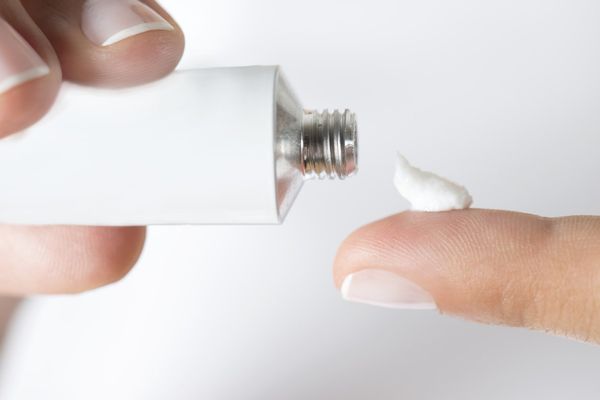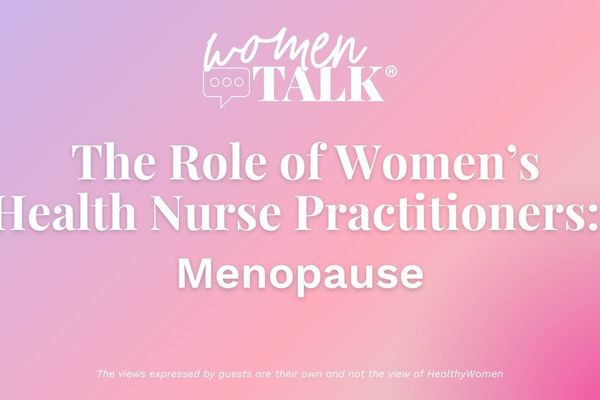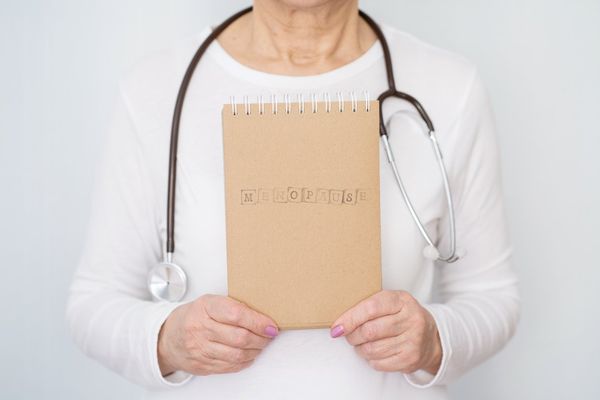Survey Cites Embarrassment as Leading Reason
RED BANK, NJ – A new HealthyWomen survey of postmenopausal women reveals that many of them are embarrassed to discuss the vaginal and sexual symptoms of menopause with their health care professional and with their partner. Among the survey respondents who did discuss their symptoms with their health care professional, over one quarter said they waited more than two years before doing so. Many of the postmenopausal women surveyed who had not spoken with their health care professional were either too embarrassed or believed incorrectly that their vaginal and sexual symptoms cannot be addressed medically.
“There appears to be a general reluctance to discuss or address the vaginal and sexual symptoms of menopause, unfortunately resulting in many postmenopausal women learning to live with these symptoms,” said Laura Berman, PhD, assistant clinical professor of OB-GYN and psychiatry at the Feinberg School of Medicine at Northwestern University, and one of the survey consultants. “The lack of communication around these common symptoms often causes women to just shut down sexually and avoid intimacy altogether. More than half of the survey respondents who are in a committed relationship reported that their condition puts a strain on their sexual relationship.”
Survey results indicate that approximately half of the postmenopausal women surveyed (48 percent) were aware that painful intercourse is a symptom of menopause, while almost all were aware of hot flashes and vaginal dryness as symptoms. Vaginal dryness is a common symptom of menopause, and was experienced by 56 percent of survey respondents. Painful intercourse, another menopause symptom, was experienced by 26 percent of respondents. Unfortunately, painful intercourse, which is said to be one of the most bothersome symptoms of menopause, typically does not subside without treatment.
“The survey indicates there is a misconception that little can be done to alleviate the vaginal dryness that can make sex painful for some postmenopausal women,” said Michael L. Krychman, Medical Director of Sexual Medicine at Hoag Hospital and Executive Director of the Southern California Center for Sexual Health and Survivorship Medicine in Newport Beach, Calif., the other consultant for the survey. “Painful intercourse and vaginal dryness are common symptoms of menopause, but unfortunately, they do not go away on their own and can get worse over time. Women should speak to their health care professional to discuss safe and effective treatments that can help to manage these symptoms.”
The survey was supported by Pfizer Inc. to help better understand postmenopausal women’s knowledge and attitudes towards the vaginal and sexual symptoms of menopause.
“The survey results demonstrate the difference between the way society perceives men’s sexual problems and women’s. More than half of the women surveyed thought that there is more openness to discussing men’s physical sexual problems than women’s,” says Elizabeth Battaglino Cahill, RN, Executive Director of HealthyWomen. “Our organization encourages women to speak with their health care professionals about their sexual health and to explore potential treatment options.”
Other Survey Highlights
Perceived stigma associated with menopausal symptoms
- Of the postmenopausal women surveyed, almost one in ten (8 percent) reported they were not aware of women’s sexual problems, such as painful intercourse, while only 3 percent reported they were not aware of men’s sexual problems, such as erectile dysfunction.
- Forty percent of postmenopausal women surveyed felt that it is taboo in society for a woman to acknowledge that she is experiencing symptoms of menopause such as vaginal dryness or painful intercourse.
Vaginal symptoms are being endured
- In fact, almost all of the postmenopausal women (93 percent) surveyed who reported experiencing painful intercourse indicated that they still engage in intercourse, even though it is painful, with 40 percent engaging in intercourse at least once a week. -Of the postmenopausal women surveyed who reported engaging in intercourse even though it is painful, almost three-quarters (73 percent) said they engage in painful intercourse because of their partner. Impact on sexual activity
- Of the postmenopausal women surveyed, half of those who reported experiencing vaginal dryness (50 percent) and two-thirds of those who reported experiencing painful intercourse (66 percent) indicated that their symptoms make them uninterested in intercourse.
Awareness of treatment is lacking
- Although more than three-quarters of the postmenopausal women surveyed indicated they were aware of over-the-counter treatments for vaginal dryness and painful intercourse (78 percent), almost half (46%) were not aware that prescription treatments are available for these conditions.
About the Survey and Methodology
HealthyWomen commissioned the research firm Harris Interactive to conduct an online custom research survey administered to postmenopausal women. The online survey was conducted among 1,043 postmenopausal women aged 40 years or older who reside in the U.S. Respondents for this survey were selected from among those who have agreed to participate in Harris Interactive surveys. Because the sample is based on those who have agreed to participate in the Harris Interactive online research panel, no estimates of theoretical sampling error can be calculated. Online interviews averaged 13 minutes and took place between April 19 and May 3, 2011. Results were weighted for age, race/ethnicity, education, region and household income. For additional information on the survey, visit www.HealthyWomen.org or www.PersonalMenopauseAnswers.com.
The following consultants each received compensation from Pfizer for their work on this project:
Dr. Laura Berman, assistant clinical professor of OB-GYN and psychiatry at the Feinberg School of Medicine at Northwestern University.
Dr. Michael Krychman, medical director of sexual medicine at Hoag Hospital and the executive director of the Southern California Center for Sexual Health and Survivorship Medicine in Newport Beach, California.
About HealthyWomen
HealthyWomen is the nation's leading independent health information source for women. For more than 20 years, women have been coming to HW for answers to their most pressing and personal health care questions. HW provides health information through our wide array of online content and print publications that is original, objective, reviewed and approved by medical experts and reflects the latest advances in evidence-based health research. Its award-winning website, www.HealthyWomen.org®, has been recognized by ForbesWoman as one of the "Top 100 Websites for Women" for two consecutive years and was named the top women's health website by Dr. Mehmet Oz in O, The Oprah Magazine. For more information, visit www.HealthyWomen.org. About Harris Interactive Harris Interactive is one of the world’s leading custom market research firms, leveraging research, technology, and business acumen to transform relevant insight into actionable foresight. Known widely for the Harris Poll and for pioneering innovative research methodologies, Harris offers expertise in a wide range of industries including healthcare, technology, public affairs, energy, telecommunications, financial services, insurance, media, retail, restaurant, and consumer package goods. Serving clients in over 215 countries and territories through our North American, European, and Asian offices and a network of independent market research firms, Harris specializes in delivering research solutions that help us – and our clients – stay ahead of what's next. For more information, please visit www.harrisinteractive.com.
Pfizer Inc.: Working Together for a Healthier World™
At Pfizer, we apply science and our global resources to improve health and well-being at every stage of life. We strive to set the standard for quality, safety and value in the discovery, development and manufacturing of medicines for people and animals. Our diversified global health care portfolio includes human and animal biologic and small molecule medicines and vaccines, as well as nutritional products and many of the world’s best-known consumer products. Every day, Pfizer colleagues work across developed and emerging markets to advance wellness, prevention, treatments and cures that challenge the most feared diseases of our time. Consistent with our responsibility as the world’s leading biopharmaceutical company, we also collaborate with health care providers, governments and local communities to support and expand access to reliable, affordable health care around the world. For more than 150 years, Pfizer has worked to make a difference for all who rely on us. To learn more about our commitments, please visit us at www.pfizer.com.






